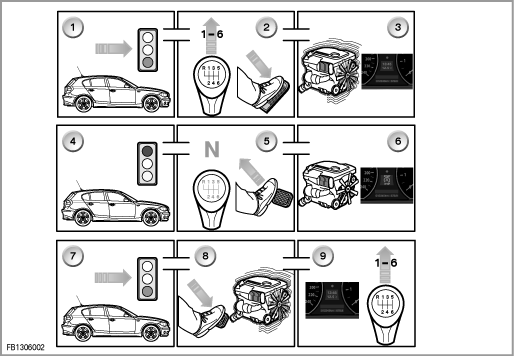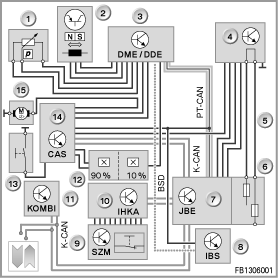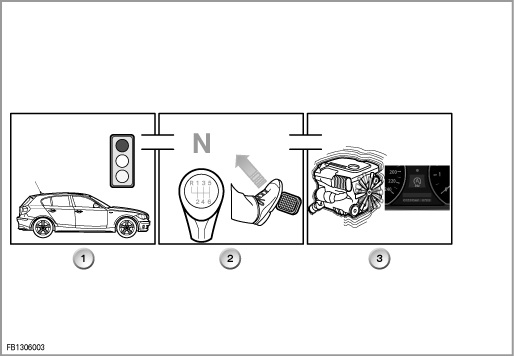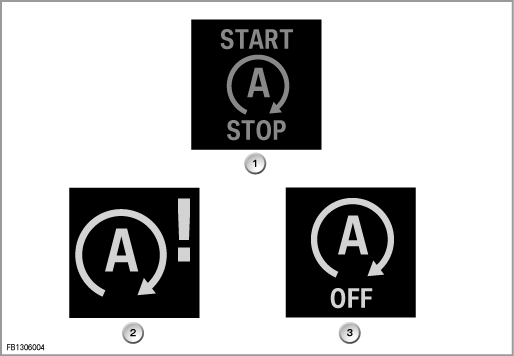
The new function of automatic engine start-stop (MSA) is a fundamental component of the measures package to reduce CO2 emissions. The reduction in fuel consumption is achieved by automatic shutdown of the engine when the vehicle is at a standstill. The new start also takes place automatically as soon as the corresponding conditions required for switch-on are met.
The MSA will be deployed in the model series 1 Series, 3 Series and MINI in conjunction with the manual gearbox and four-cylinder engine.
The MSA ensures automated shutdown of the engine while the vehicle is being driven if the vehicle comes to a standstill and a number of essential vehicle conditions are met to enable this shutdown. There are approximately twenty of these vehicle conditions (so-called shutdown inhibitors), for example:
Just as automatic as thus shutdown is the automatic new start of the engine as soon as the clutch is operated again.
Sample scenario: switching off the engine at a standstill at a red traffic light or in stop-and-go traffic.

Index |
Explanation |
Index |
Explanation |
Index |
Explanation |
1 |
Vehicle moving |
2 |
Gear is engaged. |
3 |
The engine is running. |
4 |
The driver brakes until the vehicle comes to a standstill. |
5 |
The driver engages neutral and releases the clutch pedal. |
6 |
The engine shuts down. |
7 |
The driver wants to continue the journey. |
8 |
The driver presses the clutch pedal. |
9 |
The gear can be engaged and the journey continued. |
Important!
The fully automatic switch-on of the engine on MSA vehicles can also occur when the driver performs no action at all. Customer annoyance and customer complaints are not based on a malfunction - this is planned! Situations in which the engine starts fully automatically without any action on the part of the driver are for example:
The MSA function is located in the engine electronics (DME/DDE). Various information from the bus systems is used for the MSA function. New components are also necessary. The following components for the MSA are described:

Index |
Explanation |
Index |
Explanation |
1 |
Brake partial vacuum sensor |
2 |
Zero gear sensor |
3 |
Engine management system (DME/DDE) |
4 |
DC/DC converter |
5 |
Input/output of the DC/DC converter to the distribution box |
6 |
Distribution box (junction box) |
7 |
Junction Box Electronics |
8 |
Intelligent battery sensor (IBS) at the negative battery terminal |
9 |
Centre console switch centre with MSA button |
10 |
Integrated automatic heating and air conditioning system |
11 |
Instrument cluster |
12 |
Clutch Switch |
13 |
Bonnet contact switch |
14 |
Car Access System |
15 |
Starter motor |
|
|
The zero gear sensor is fitted a the top of the gearbox case and it has the task of detecting the idle position of the gearstick.
In order to ensure adequate partial vacuum brake power assistance in every situation, the brake booster is equipped with a partial vacuum sensor.
The brake partial vacuum sensor is located beside the brake booster and is connected via a separate cable.
Important!
With a brake partial vacuum that is too low, the MSA also starts without activity on the part of the driver. Insufficient brake partial vacuum can lead to safety risks during braking manoeuvres. To prevent this, the engine is started.
The MSA button (MSA OFF) on the centre console switching centre can be used to deactivate the MSA function. With each terminal change <Terminal 15 On> or repeated pressing of the MSA button, the MSA is reactivated.
The present clutch switch is used as an input variable for the MSA to detect clutch operation.
The bonnet contact switch is included as an influencing factor in the calculation of the MSA. If the engine compartment lid is opened, the engine must not be started or stopped by the MSA function for safety reasons.
Important!
In the event of a defective bonnet contact switch, the MSA function is suppressed.
If the bonnet contact switch is pulled upwards, the information <Switch closed> is displayed. The MSA function is active and an automatic engine start can take place.
Via the belt buckle switch, the MSA can detect that the driver has fastened his or her seat belt. If the driver has not fastened his or her seat belt, the MSA reacts as follows:
Due to the considerably more frequent occurrence of starting operations, the electrical load that occurs often leads to voltage dips in the vehicle network. In order to stabilise the power supply for certain voltage-sensitive electrical components and thus protect them, a DC/DC converter is used in conjunction with the MSA.
The DC/DC converter supplies the two relays <terminal 30g_DC/DC> and <terminal 30g-f_DC/DC> with a voltage that also remains constant during the starting operation.
The DC/DC converter is fitted in the E-box in the engine compartment.
Via the test leads for input voltage and terminal 50, the electronics decide whether the power is supplied to the output via the bypass or the DC/DC converter.
In the bypass mode, the on-board supply voltage is not fed across the DC/DC converter, rather is transferred directly to the outputs. In the boost mode, there is an adaptation of the on-board supply voltage.
In all cases, the MSA comes with the intelligent alternator control. The much more frequent charge and discharge cycles mean that the load on the battery is very high. The cycle resistance of AGM batteries means that they achieve similar results with regard to service life despite the high load.
Important!
In all cases, an AGM battery must be fitted and registered in the vehicle for the MSA to function perfectly.
The following system functions for the MSA are described:
After every engine start, the function is automatically active and on stand-by. The MSA button (centre console switching centre) can be used to deactivate the function manually until the next terminal change. Pressing the button is confirmed by an LED lighting up.
Permanent deactivation of the function is only permitted in extreme exceptional situations (coding by means of Progman: MSA button, memory function of the IHKA).
During the diagnosis sessions, the MSA function is temporarily deactivated for safety reasons (that means until the next terminal change) to prevent the possibility of an automatic engine start during work in the engine compartment. The status of a temporary deactivation can always be tread in the control unit functions by means of <detection of deactivation MSA>. Furthermore, the status of the detection / non-detection of an MSA vehicle can be read out in the control unit functions by means of <check installation of MSA> as well as <status coding MSA>.
Important!
For reasons of personal safety, it must always be conscientiously determined that the engine start-stop function has been disabled before work in the engine compartment!
The MSA function is only possible if certain requirements are met. The engine is switched off if:
An MSA stop is prevented if required due to environmental influences, vehicle conditions and engine operating values. The following shutdown inhibitors are possible, for example:

Index |
Explanation |
1 |
The driver brakes until the vehicle comes to a standstill. |
2 |
The driver engages neutral and releases the clutch pedal. |
3 |
The engine continues to run. A shutdown inhibitor is present. |
The software-internal operating strategy of the MSA function controls the following actions:
The driver receives information on the current status by means of corresponding messages in the display in the instrument cluster.
Current EAs, EVs, AAs, AVs and deactivators as well as general status information can be read out using the service function <System check MSA>. Reading out a history of the last stored shutdown inhibitors is possible by means of the service function <Read AV memory>. This enables a check of past customer complaints.
The driver has a new indicator light for the MSA in the instrument cluster as acknowledgement.

Index |
Explanation |
Index |
Explanation |
1 |
MSA has shut down the engine automatically. |
2 |
MSA fault. |
3 |
MSA disabled. |
|
|
The Check Control messages appear when system faults (with or without the necessary component replacement) are active or software-related deactivations have taken place.
The corresponding readout options are available through the service functions <System check MSA> as well as <Read AV memory>.
Other service functions serve for additional plausibility checks and checking the functional characteristics (exception: learn / write zero gear sensor).
The battery status that is calculated in the Advanced Power Management (APM) is a major influencing factor on the MSA. The aim is to enable a reliable start of the combustion engine after a defined immobilisation period from the perspective of the vehicle energy system.
The APM monitors the following data: battery charge state, battery temperature, voltage dip during engine start, power requirement of switched-on consumer units. The result of the calculation can be shutdown inhibitor or switch-on requester of the MSA.
In the event of engine shutdown, excessive power consumption must be avoided. To ensure this, at terminal 15 ON and engine OFF, the APM disables all large current consumer units or reduces their consumption. The displays remain active.
The following consumer units are affected:
Important!
If the battery charge state drops after an MSA engine shutdown to below a certain limit, the MSA starts the engine even without any action on the part of the driver.
The MSA only works when certain requirements are met (see Operating conditions). In the event of customer complaints, always check these requirements.
Automatic shut-down at terminal 15 as of 03/2007 in vehicles with automatic engine start-stop function (MSA - optional extra 1CC).
Opening or closing the driver's door automatically switches off terminal 15 via the signal from the door contact.
By subsequently pressing the START-STOP button, terminal 15 can be switched on again permanently.
Run this operation before programming or diagnosing a vehicle!
Replacement of the gearbox zero gear sensor
The gearbox zero gear sensor component may only be replaced in line with the instructions in the service function <Learn/write zero gear sensor>, as without correct fitting of the sensor the functionality is inactive and/or faulty.
Furthermore, this service function must be run after programming the engine management system, as according to the current implementation the learning values are stored in volatile form in the engine management system.
Be sure to comply with preventative safety measures for work on MSA vehicles!
Before practical work on the engine, always ensure that the MSA functionality is switched off in order to prevent an automatic engine start during work in the engine compartment!
MSA faults
In general, stored faults of the MSA system deactivate the automatic engine start-stop.
MSA and power management
The MSA function is strongly networked with the power management. In the event of a battery replacement, disconnection of the battery or after programming the engine management system, the reference data regarding the battery charge state and battery condition can be lost.
They are only available again after a closed-circuit current measurement of approx. 6 hours (e.g. closed-circuit current measurement overnight) in which the vehicle may not be wakened. In this training period, the MSA function is not active.
The customer is to be notified of this when the vehicle is handed over. The MSA function switches back automatically to active as soon as the necessary routine have been completed successfully.
The following test modules exist to check the components:
The service function <Read AV memory> can be used to read out a history of the last stored shutdown inhibitors.